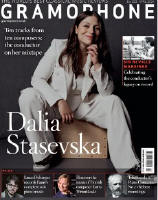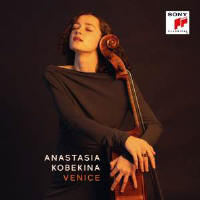Texte paru dans: / Appeared in: |
|
|
|
|
|
Silvestrov, Dowland, Shaw, Rota, Brian Eno … none of these names immediately suggest Venice, but the fact that they appear on cellist Anastasia Kobekina’s so-titled debut on Sony Classical shouldn’t surprise anyone already familiar with the creativity that comes so apparently naturally to this recent BBC New Generation Artist. Kobekina’s programme, performed on both Baroque cello and ‘modern’ set-up, depicts Italy’s ancient floating city not simply along historical, musicological lines but as an expression of the myriad impressions and emotions it means to her. To this concept, add some very special defining qualities: the sheer sense of organic flow with which it then all unfurls, the apparent effortlessness of Kobekina’s own sound – at times you forget you’re listening to a cello at all, it sounds so lithely human – and a host of often movingly intimate-feeling musical collaborations. Dowland’s ‘Go, crystal tears’ is a potent example of all the above, Kobekina’s instrument sounding so much like a supple, airily amber-toned, exquisitely singing human voice, dropping down at points to the barest of whispers, with the closeness of the bond between her and her theorbist partner Azul Lima verily burning out of the stereo.
This being Venice, Vivaldi also gets his full due, via two full cello concertos and three isolated concerto movements supported with bright, spry energy by the Kammerorchester Basel. Dropped at pleasingly symmetric intervals through the running order, these are a strong unifying force; but best of all is how their colours and qualities are enhanced and heard afresh through what happens either side. Whoever would have thought, for instance, that the darkly fiery G minor outer ends of RV416 could be so evocatively set up by Kurtág’s slyly scuttling ‘Árnyak’ (‘Shadows’), and departed from via the barcarolle-like lilt of Fauré’s melancholy cradle song ‘Les berceaux’, weeping for men gone to sea. Slow-movement pleasures meanwhile include the way RV416’s accompanying textures are built up and then down again – it’s a wonderful moment, about a minute in, when the harpsichord suddenly enters like a glinting sun; and always, Kobekina’s filigree embellishments sound as natural as breathing even at their most ornately baroque heights.
What else? The snap, spring and pulse of Caroline Shaw’s string duo Limestone & Felt rolling into Bach’s sensuously throbbing, long-breathed Adagio song from his Concerto in D minor, BWV904 (after Alessandro Marcello); programme-closing Ariadne’s Lament, a soul-filled variations on a theme by Claudio Monteverdi by Kobekina’s own father, Vladimir Kobekin; overall, the perfectly weighted balancing and elegant immediacy of the engineering.
The magical sum of all these parts is then that – if you yourself have walked Venice’s ancient high-walled alleyways imagining Vivaldi and Monteverdi, if you’ve experienced the nightlife of its residents’ quarter and gazed upwards in St Mark’s – while the single impression all this leaves is hard to articulate, its essence is so ephemeral you will feel it every second of this album. And that, folks, is true art. |
|




